Uncategorized
Crypto Daybook Americas: Bitcoin Meltdown Worsens as Macro Jitters Overshadow Positives

By Omkar Godbole (All times ET unless indicated otherwise)
It’s the dip that keeps on dipping. Bitcoin took another hit early Friday, falling below $80,000 and taking February’s decline to over 20%. That spurred a bloodbath in the broader crypto market, with ether sliding below $2,100, a level it managed to hold since August.
It’s not just crypto. Increased volatility in cryptocurrencies mirrors trends in traditional markets. Compare the 10% jump in the Volmex BVIV, which tracks the 30-day implied volatility in bitcoin, with the equal increase in the MOVE index, which measures the implied volatility of U.S. Treasury notes. The VIX, Wall Street’s so-called fear gauge, has risen by 14%.
These movements, coupled with a sell-off in growth-sensitive commodity currencies like the Australian, New Zealand and Canadian dollars, are indicative of jitters in the macroeconomy, primarily driven by renewed concerns over potential Trump tariffs, prompting a rotation towards less volatile assets.
«U.S. domestic policies have become unstable, and the White House seems happy to take advantage of this instability,» said Griffin Ardern, head of options trading and research at crypto financial platform BloFin. «Given the challenges investors face in obtaining accurate forward-looking guidance, many are more inclined to hold low-volatility assets … Traders need to liquidate positions to reduce their exposure to specific assets before transitioning to other markets, which explains the decline across almost all asset classes, including cryptocurrencies.»
Volatility looks set to remain heightened, with President Donald Trump reportedly scheduled to speak later on Friday. In the meantime, those hoping for a significant rebound in risk assets based on personal consumption data may be disappointed because anticipated soft readings could be overshadowed by tariff concerns and rising forward-looking inflation metrics.
While the outlook may seem gloomy, more positive developments could occur once the macro dust settles. Notably, this week there was progress on the regulatory front, with the SEC dropping charges against Uniswap, one of the leading decentralized exchanges, and mulling the same regarding its issues with Consensys.
As Evgeny Gaevoy, CEO of leading market maker Wintermute, pointed out at Consensus Hong Kong last week, many are overlooking the evolving attitude of the SEC, and this is a factor the market has yet to fully price in.
Plus, the decline in the basis in the CME bitcoin and ether futures, a sign of weakening demand, has stalled and from a technical analysis perspective, bitcoin is fast closing toward a potential demand zone. So, stay alert!
What to Watch
Crypto:
March 1: Spot trading on the Arkham Exchange goes live in 17 U.S. states.
March 5, 2:29 a.m.: Ethereum testnet Sepolia gets the Pectra hard fork network upgrade at epoch 222464.
March 15: Athene Network (ATH) mainnet launch.
March 24, 11:00 a.m.: Bugis network upgrade goes live on Enjin Matrixchain mainnet.
Macro
Feb. 28, 8:30 a.m.: The U.S. Bureau of Economic Analysis releases January personal consumption and expenditure data.
Core PCE Price Index MoM Est. 0.3% vs. Prev. 0.2%
Core PCE Price Index YoY Est. 2.6% vs. Prev. 2.8%
PCE Price Index MoM Est. 0.3% vs. Prev. 0.3%
PCE Price Index YoY Est. 2.5% vs. Prev. 2.6%
Personal Income MoM Est. 0.3% vs. Prev. 0.4%
Personal Spending MoM Est. 0.1% vs. Prev. 0.7%
March 2, 8:45 p.m.: Caixin and S&P Global release February China manufacturing data.
Manufacturing PMI Prev. 50.1
Earnings
March 6 (TBC): Bitfarms (BITF), $-0.04
March 17 (TBC): Bit Digital (BTBT), $-0.05
March 18 (TBC): TeraWulf (WULF), $-0.03
March 24 (TBC): Galaxy Digital Holdings (TSE: GLXY), C$0.38
Token Events
Governances votes & calls
Sky DAO is discussing the reduction of the Smart Burn Engine activity, which would effectively reduce the rate of SKY token buybacks from around 1 million USDS to 400,000 USDS per day.
Lido DAO is discussing a proposal on an SSV Lido Module (SSVLM), a permissionless staking module, that would distribute staking rewards to node operators, the Lido Protocol and the module operations.
Feb. 28, 12 p.m.: VeChain (VET) to host a VeChain Builders AMA.
Unlocks
Mar. 1: DYdX to unlock 1.14% of circulating supply worth $5.58 million.
Mar. 1: ZetaChain (ZETA) to unlock 6.48% of circulating supply worth $12.45 million.
Mar. 1: Sui (SUI) to unlock 0.74% of circulating supply worth $60.40 million.
Mar. 2: Ethena (ENA) to unlock 1.3% of circulating supply worth $15.91 million.
Mar. 7: Kaspa (KAS) to unlock 0.63% of circulating supply worth $12.35 million.
Mar. 8: Berachain (BERA) to unlock 9.28% of circulating supply worth $73.80 million.
Mar. 9: Movement (MOVE) to unlock 2.08% of its circulating supply worth $21.4 million.
Token Listings
Feb. 28: Worldcoin (WLD) to be listed on Kraken.
Feb. 28: Zcash (ZEC) and Dash (DASH) are being delisted from Bybit.
Feb. 28: Sonic SVM (SONIC) to be listed on AscendEX.
Feb. 28: RedStone (RED) to be listed on Binance and MEXC.
Conferences
CoinDesk’s Consensus to take place in Toronto on May 14-16. Use code DAYBOOK and save 15% on passes.
Day 6 of 8: ETHDenver 2025 (Denver)
March 2-3: Crypto Expo Europe (Bucharest)
March 8: Bitcoin Alive (Sydney)
March 10-11: MoneyLIVE Summit (London)
March 13-14: Web3 Amsterdam ‘25 (Netherlands)
March 19-20: Next Block Expo (Warsaw)
March 26: DC Blockchain Summit 2025 (Washington)
March 28: Solana APEX (Cape Town)
Token Talk
By Shaurya Malwa
Lazarus Group, the North Korea-backed hacker group, is laundering over $240 million in ether through THORChain, a decentralized cross-chain swap protocol, by converting it mainly to bitcoin.
THORChain enables cross-chain swaps without wrapped assets, maintaining user custody and securing funds on the blockchain.
Derivatives Positioning
TRX and TRON are seeing negative perpetual funding rates, or dominance of bearish, short positions, as the crypto sell-off deepens. Most other major coins still have positive funding rates.
On decentralized exchange Derive.xyz, ETH’s options skew for both the 7-day and 30-day options has sharply dropped to -15% and -6% respectively, representing a strong bias for protective puts.
The way bitcoin options on on Derive were priced at press time showed a 44% chance BTC settling below $80K by the end of June. and just 3.5% chance of prices rising to $150K, talk about the fear in the market.
On Deribit, BTC and ETH options showed a bias for puts in expiries up to the April end.
Market Movements:
BTC is down 3.3% from 4 p.m. ET Thursday at $80,552.45 (24hrs: -7.09%)
ETH is down 4.62% at $2,135.58 (24hrs: -9.3%)
CoinDesk 20 is down 4.63% at 2,821.02 (24hrs: -8.31%)
Ether CESR Composite Staking Rate is up 4 bps at at 3.06%
BTC funding rate is at 0.0069% (7.55% annualized) on Binance
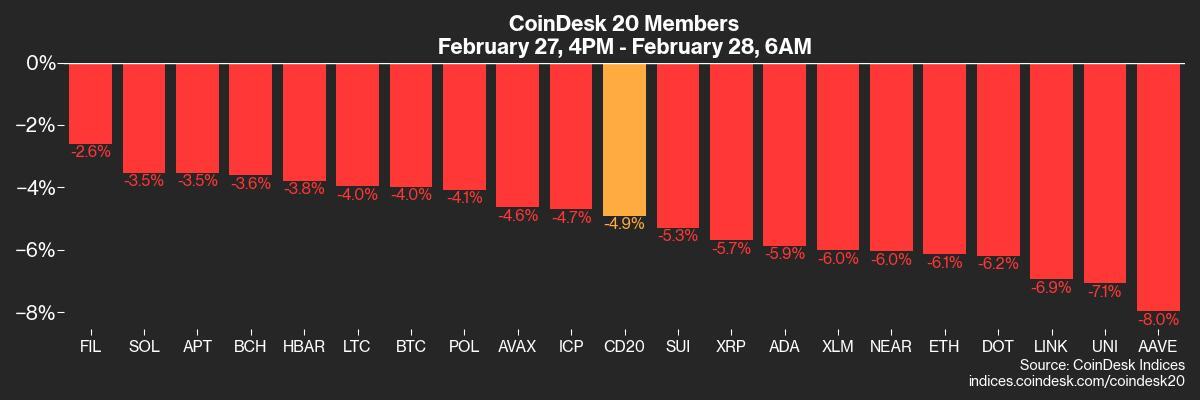
DXY is unchanged 107.32
Gold is down 0.77% at $2,863.13/oz
Silver is down 1.09% at $31.15/oz
Nikkei 225 closed -2.88% at 37,155.50
Hang Seng closed -3.28% at 22,941.32
FTSE is up 0.25% at 8,778.39
Euro Stoxx 50 is down 0.49% at 5,445.93
DJIA closed on Thursday -0.45% at 43,239.50
S&P 500 closed -1.59% at 5,861.57
Nasdaq closed -2.78% at 18,544.42
S&P/TSX Composite Index closed -0.79% at 25,128.24
S&P 40 Latin America closed -1.36% at 2,347.52
U.S. 10-year Treasury rate is down 2 bps at 4.26%
E-mini S&P 500 futures are up 0.34% at 5896.50
E-mini Nasdaq-100 futures are up 0.3% at 20667.25
E-mini Dow Jones Industrial Average Index futures are up 0.33% at 43,438.00
Bitcoin Stats:
BTC Dominance: 60.51 (-0.41%)
Ethereum to bitcoin ratio: 0.02681 (-1.58%)
Hashrate (seven-day moving average): 844 EH/s
Hashprice (spot): $48.1
Total Fees: 8.38 BTC / $715,412
CME Futures Open Interest: 155,245 BTC
BTC priced in gold: 27.5 oz
BTC vs gold market cap: 7.80%
Technical Analysis
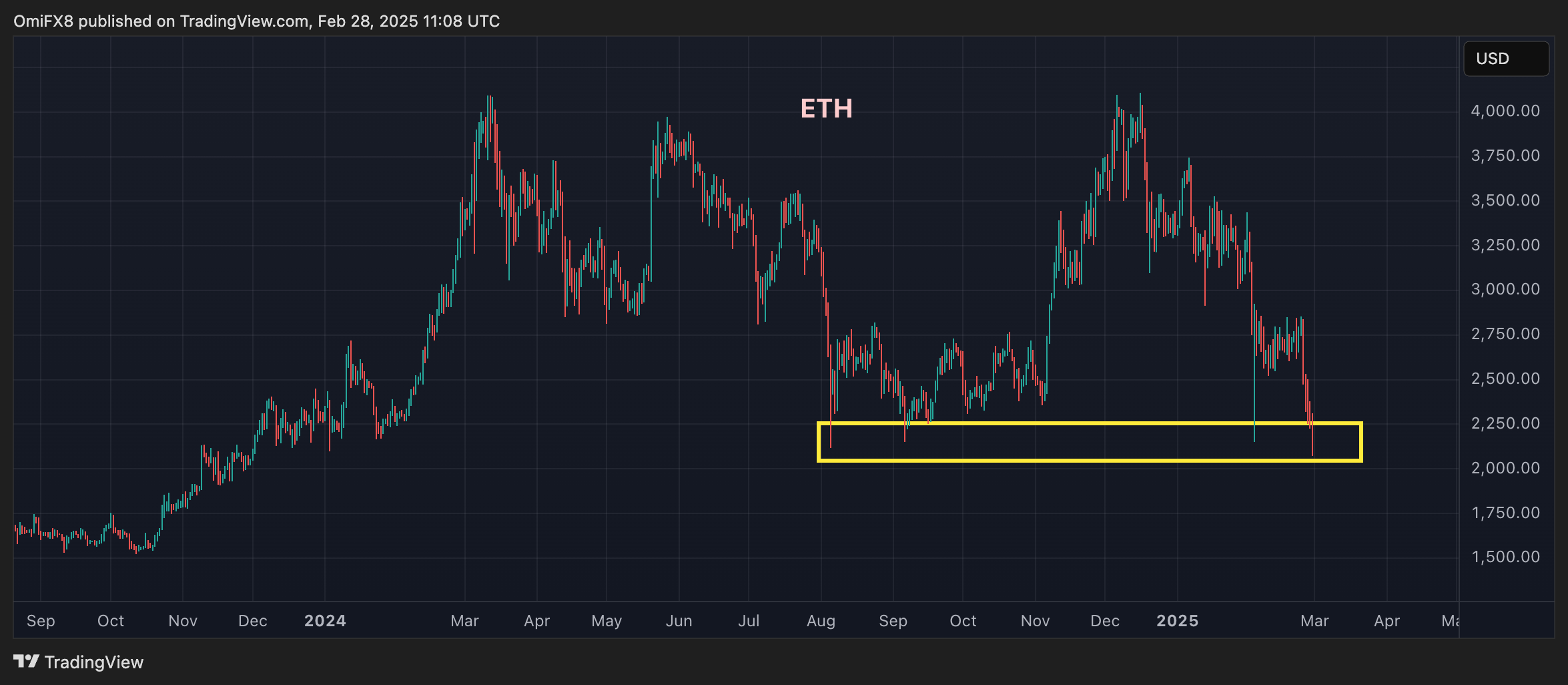
Ether is at a make or break level of $2,100, which has seen seller exhaustion several times since August last year.
If the support gives way, it could trigger additional selling by long-term holders, leading to an extended slide.
Crypto Equities
MicroStrategy (MSTR): closed on Thursday at $240.05 (-8.82%), down 1.99% at $235.28 in pre-market
Coinbase Global (COIN): closed at $208.37 (-2.16%), down 3.64% at $200.78
Galaxy Digital Holdings (GLXY): closed at C$20.28 (+0.6%)
MARA Holdings (MARA): closed at $13.13 (+5.46%), down 3.43% at $12.68
Riot Platforms (RIOT): closed at $8.66 (-3.13%), down 3.35% at $8.37
Core Scientific (CORZ): closed at $10.71 (+6.89%), down 2.24% at $10.47
CleanSpark (CLSK): closed at $7.51 (-4.7%), down 2.4% at $7.33
CoinShares Valkyrie Bitcoin Miners ETF (WGMI): closed at $16.89 (-1.92%)
Semler Scientific (SMLR): closed at $40.63 (-7.47%), down 3.03% at $39.40
Exodus Movement (EXOD): closed at $42.20 (-5.13%), up 0.52% at $42.42
ETF Flows
Spot BTC ETFs:
Daily net flow: -$275.9 million
Cumulative net flows: $36.85 billion
Total BTC holdings ~ 1,132 million.
Spot ETH ETFs
Daily net flow: -$71.2 million
Cumulative net flows: $2.86 billion
Total ETH holdings ~ 3.702 million.
Source: Farside Investors
Overnight Flows
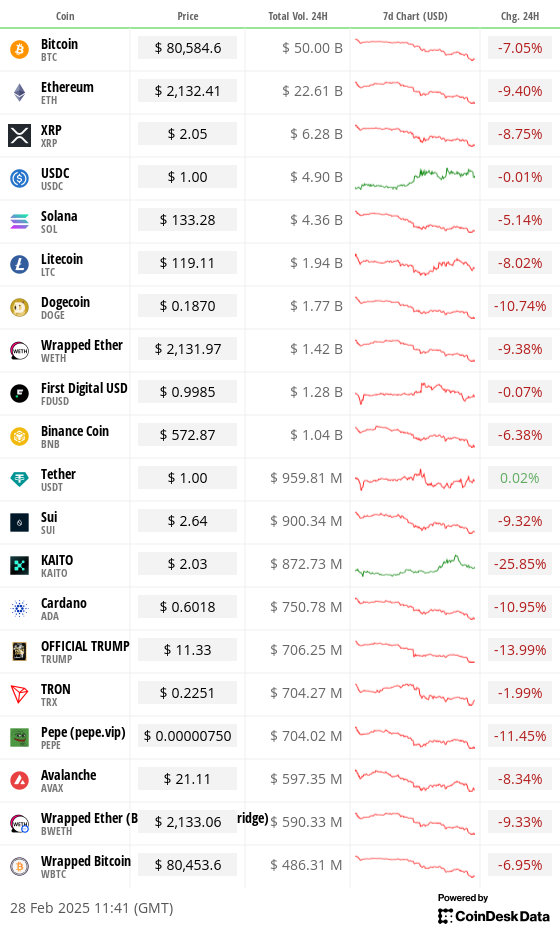
Chart of the Day
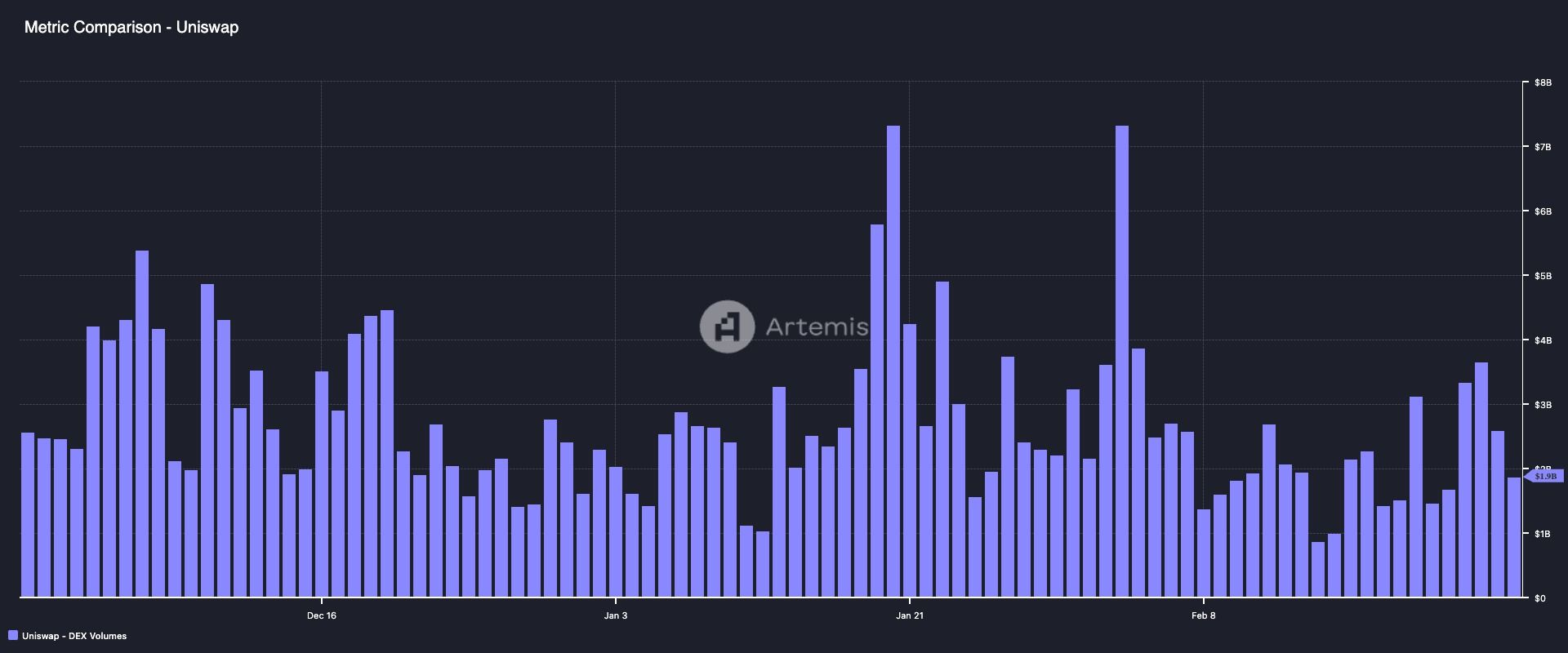
Daily trading volume on decentralized exchange Uniswap saw a small spike to $3.5 billion on Tuesday as the SEC dropped charges against the protocol.
Since then, however, volumes have tapered off, probably due to the wider market decline.
While You Were Sleeping
Bitcoin Tumbles to $80K, XRP Loses Key Support as Trump Tariffs Regain Centrality, Dollar Index Rises (CoinDesk): President Donald Trump said 25% tariffs on imports from Canada and Mexico and an additional 10% tariff on Chinese imports will take effect on March 4.
Bitcoin Sell-Off Could Be a Textbook ‘Breakout and Retest’ Play: Godbole (CoinDesk): Bitcoin’s 15% drop below $80,000 may reflect typical market behavior, where traders test a former resistance level before potentially fueling another rally.
Trump’s Tariff Onslaught Is Coming Faster Than His Team Can Carry It Out (The Wall Street Journal): Trump’s reciprocal tariff plan, meant to align U.S. trade duties with those of other nations, is facing delays, with an April 2 report expected but full implementation likely months away.
China Vows ‘All Necessary Measures’ Against New US Tariffs (Bloomberg): China threatened retaliation after President Trump announced an additional 10% tariff on Chinese imports would take effect March 4.
Sterling Outshines Rivals on Stronger Economic Data (Financial Times): The pound is benefiting from stronger-than-expected U.K. economic data, demand for government bonds, which offer higher yields than U.S. Treasuries, and a perceived lower risk of U.S. tariffs.
Mexico Sends Major Drug Capos to U.S. as Trump Tariff Threat Looms (Reuters): On Thursday, Mexico carried out its largest extradition in years, sending 29 cartel figures to the U.S. amid pressure over fentanyl smuggling.
In the Ether


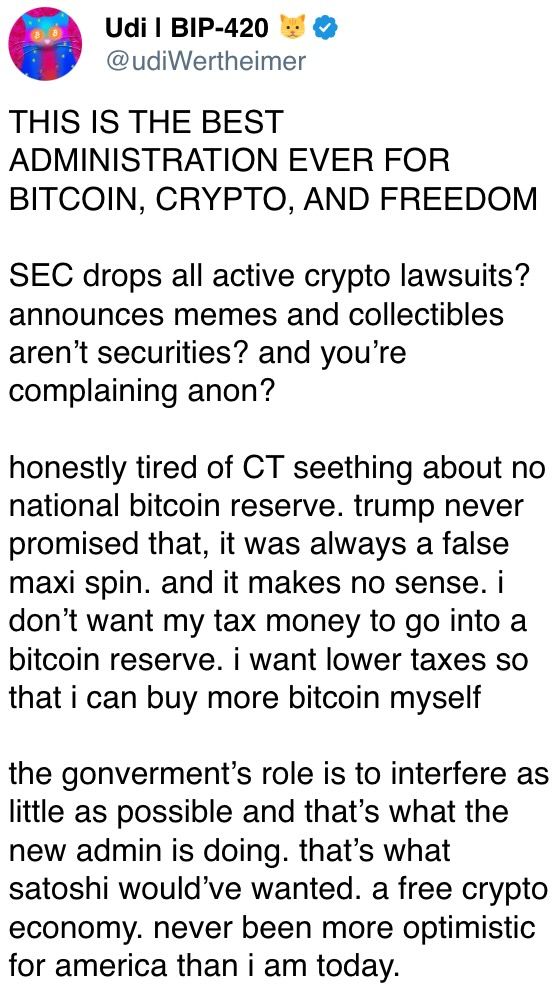

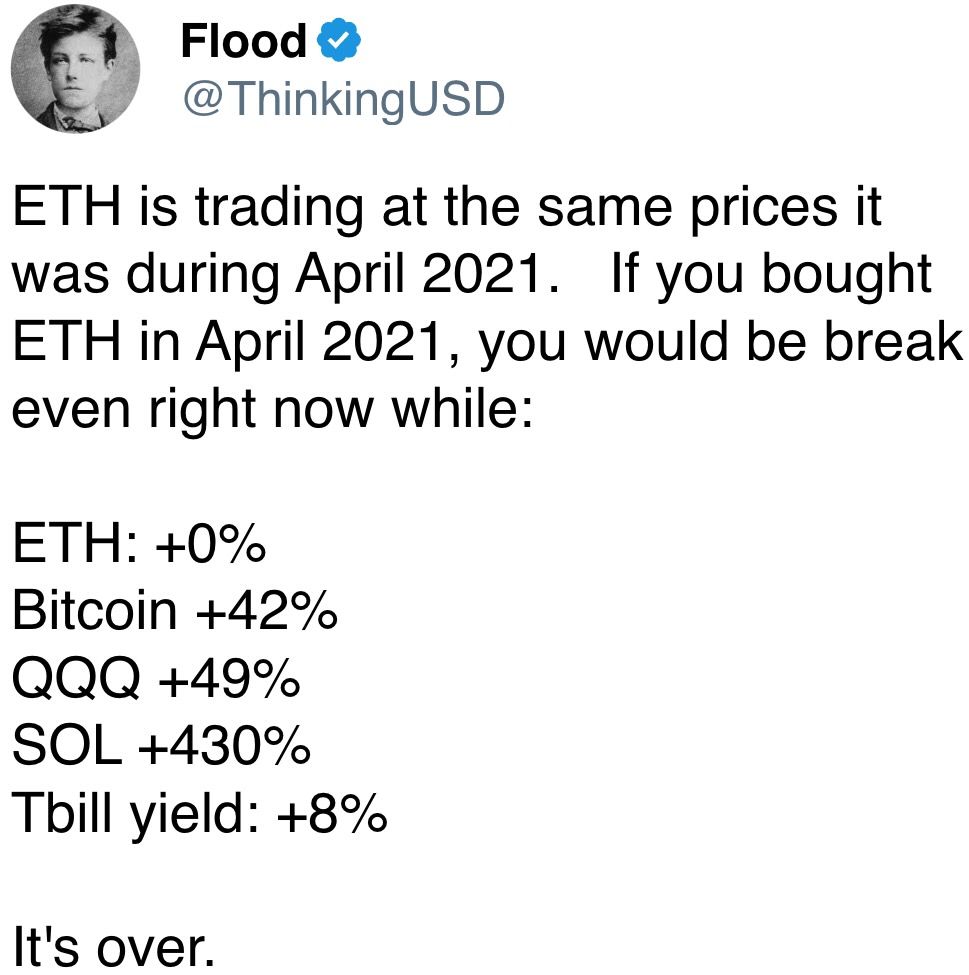

Uncategorized
Wall Street Bank Citigroup Sees Ether Falling to $4,300 by Year-End

Wall Street giant Citigroup (C) has launched new ether (ETH) forecasts, calling for $4,300 by year-end, which would be a decline from the current $4,515.
That’s the base case though. The bank’s full assessment is wide enough to drive an army regiment through, with the bull case being $6,400 and the bear case $2,200.
The bank analysts said network activity remains the key driver of ether’s value, but much of the recent growth has been on layer-2s, where value “pass-through” to Ethereum’s base layer is unclear.
Citi assumes just 30% of layer-2 activity contributes to ether’s valuation, putting current prices above its activity-based model, likely due to strong inflows and excitement around tokenization and stablecoins.
A layer 1 network is the base layer, or the underlying infrastructure of a blockchain. Layer 2 refers to a set of off-chain systems or separate blockchains built on top of layer 1s.
Exchange-traded fund (ETF) flows, though smaller than bitcoin’s (BTC), have a bigger price impact per dollar, but Citi expects them to remain limited given ether’s smaller market cap and lower visibility with new investors.
Macro factors are seen adding only modest support. With equities already near the bank’s S&P 500 6,600 target, the analysts do not expect major upside from risk assets.
Read more: Ether Bigger Beneficiary of Digital Asset Treasuries Than Bitcoin or Solana: StanChart
Uncategorized
XLM Sees Heavy Volatility as Institutional Selling Weighs on Price

Stellar’s XLM token endured sharp swings over the past 24 hours, tumbling 3% as institutional selling pressure dominated order books. The asset declined from $0.39 to $0.38 between September 14 at 15:00 and September 15 at 14:00, with trading volumes peaking at 101.32 million—nearly triple its 24-hour average. The heaviest liquidation struck during the morning hours of September 15, when XLM collapsed from $0.395 to $0.376 within two hours, establishing $0.395 as firm resistance while tentative support formed near $0.375.
Despite the broader downtrend, intraday action highlighted moments of resilience. From 13:15 to 14:14 on September 15, XLM staged a brief recovery, jumping from $0.378 to a session high of $0.383 before closing the hour at $0.380. Trading volume surged above 10 million units during this window, with 3.45 million changing hands in a single minute as bulls attempted to push past resistance. While sellers capped momentum, the consolidation zone around $0.380–$0.381 now represents a potential support base.
Market dynamics suggest distribution patterns consistent with institutional profit-taking. The persistent supply overhead has reinforced resistance at $0.395, where repeated rally attempts have failed, while the emergence of support near $0.375 reflects opportunistic buying during liquidation waves. For traders, the $0.375–$0.395 band has become the key battleground that will define near-term direction.
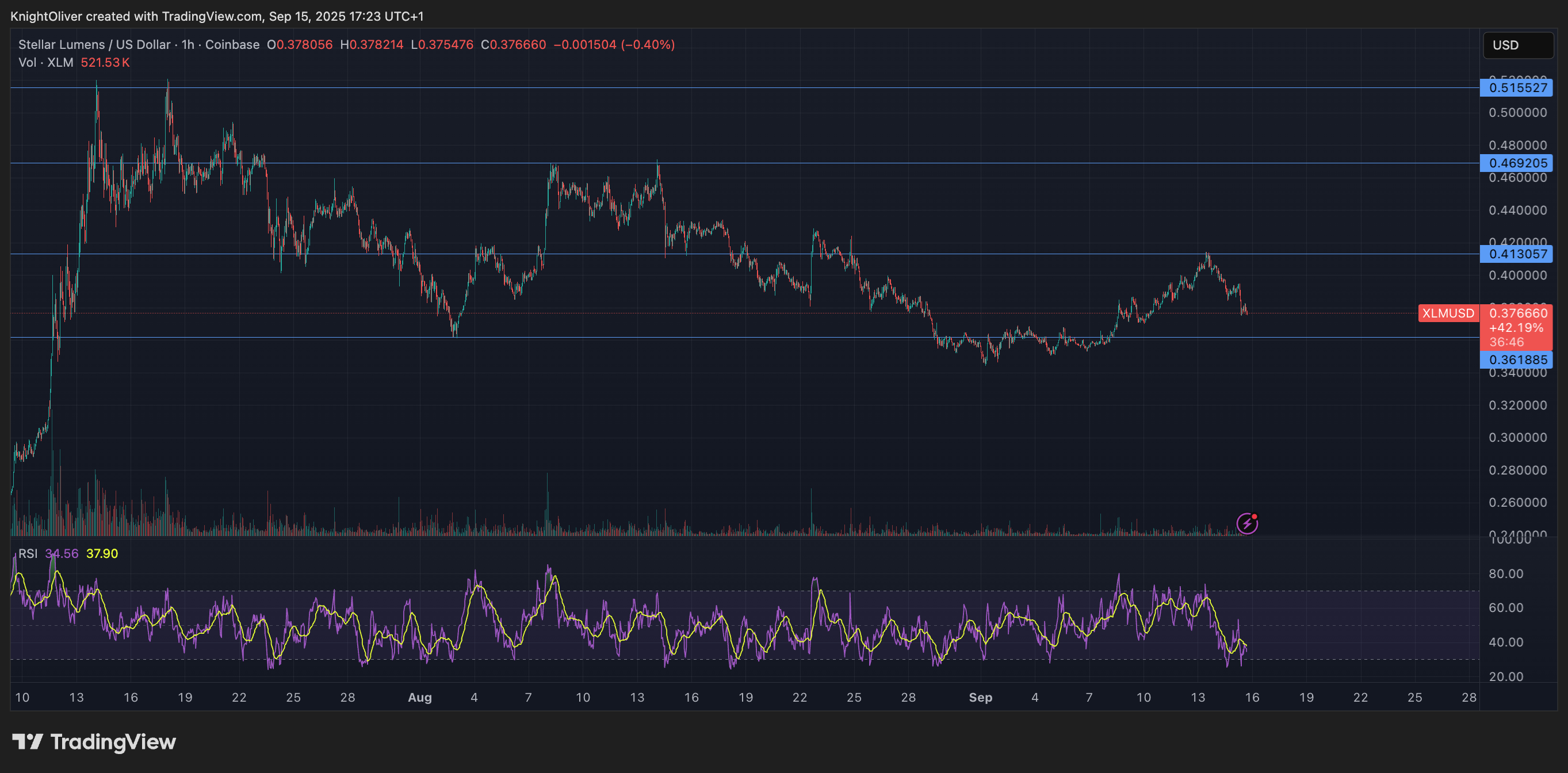
Technical Indicators
- XLM retreated 3% from $0.39 to $0.38 during the previous 24-hours from 14 September 15:00 to 15 September 14:00.
- Trading volume peaked at 101.32 million during the 08:00 hour, nearly triple the 24-hour average of 24.47 million.
- Strong resistance established around $0.395 level during morning selloff.
- Key support emerged near $0.375 where buying interest materialized.
- Price range of $0.019 representing 5% volatility between peak and trough.
- Recovery attempts reached $0.383 by 13:00 before encountering selling pressure.
- Consolidation pattern formed around $0.380-$0.381 zone suggesting new support level.
Disclaimer: Parts of this article were generated with the assistance from AI tools and reviewed by our editorial team to ensure accuracy and adherence to our standards. For more information, see CoinDesk’s full AI Policy.
Uncategorized
HBAR Tumbles 5% as Institutional Investors Trigger Mass Selloff

Hedera Hashgraph’s HBAR token endured steep losses over a volatile 24-hour window between September 14 and 15, falling 5% from $0.24 to $0.23. The token’s trading range expanded by $0.01 — a move often linked to outsized institutional activity — as heavy corporate selling overwhelmed support levels. The sharpest move came between 07:00 and 08:00 UTC on September 15, when concentrated liquidation drove prices lower after days of resistance around $0.24.
Institutional trading volumes surged during the session, with more than 126 million tokens changing hands on the morning of September 15 — nearly three times the norm for corporate flows. Market participants attributed the spike to portfolio rebalancing by large stakeholders, with enterprise adoption jitters and mounting regulatory scrutiny providing the backdrop for the selloff.
Recovery efforts briefly emerged during the final hour of trading, when corporate buyers tested the $0.24 level before retreating. Between 13:32 and 13:35 UTC, one accumulation push saw 2.47 million tokens deployed in an effort to establish a price floor. Still, buying momentum ultimately faltered, with HBAR settling back into support at $0.23.
The turbulence underscores the token’s vulnerability to institutional distribution events. Analysts point to the failed breakout above $0.24 as confirmation of fresh resistance, with $0.23 now serving as the critical support zone. The surge in volume suggests major corporate participants are repositioning ahead of regulatory shifts, leaving HBAR’s near-term outlook dependent on whether enterprise buyers can mount sustained defenses above key support.
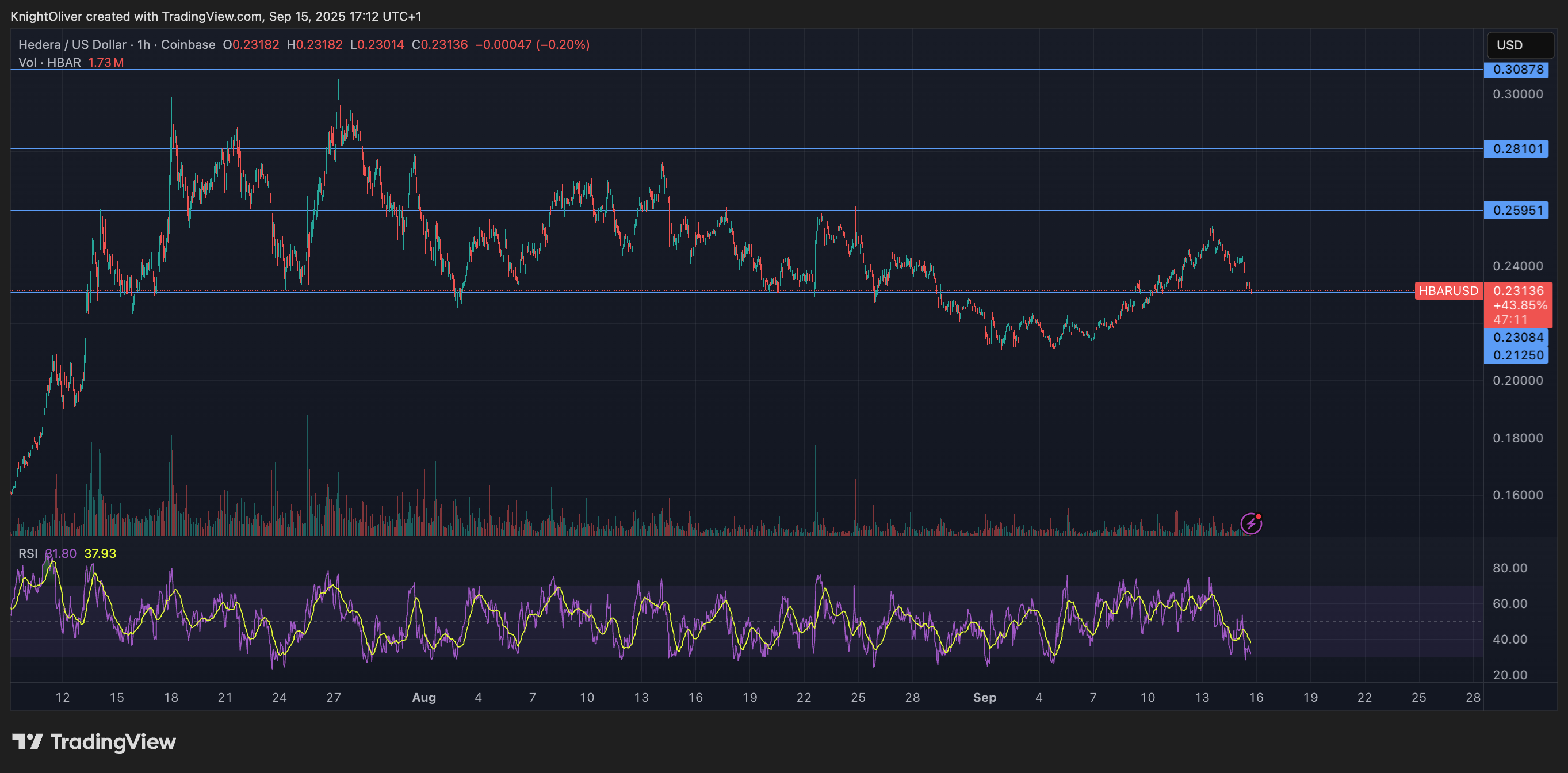
Technical Indicators Summary
- Corporate resistance levels crystallized at $0.24 where institutional selling pressure consistently overwhelmed enterprise buying interest across multiple trading sessions.
- Institutional support structures emerged around $0.23 levels where corporate buying programs have systematically absorbed selling pressure from retail and smaller institutional participants.
- The unprecedented trading volume surge to 126.38 million tokens during the 08:00 morning session reflects enterprise-scale distribution strategies that overwhelmed corporate demand across major trading platforms.
- Subsequent institutional momentum proved unsustainable as systematic selling pressure resumed between 13:37-13:44, driving corporate participants back toward $0.23 support zones with sustained volumes exceeding 1 million tokens, indicating ongoing institutional distribution.
- Final trading periods exhibited diminishing corporate activity with zero recorded volume between 13:13-14:14, suggesting institutional participants adopted defensive positioning strategies as HBAR consolidated at $0.23 amid enterprise uncertainty.
Disclaimer: Parts of this article were generated with the assistance from AI tools and reviewed by our editorial team to ensure accuracy and adherence to our standards. For more information, see CoinDesk’s full AI Policy.
-

 Business11 месяцев ago
Business11 месяцев ago3 Ways to make your business presentation more relatable
-

 Fashion11 месяцев ago
Fashion11 месяцев agoAccording to Dior Couture, this taboo fashion accessory is back
-

 Entertainment11 месяцев ago
Entertainment11 месяцев ago10 Artists who retired from music and made a comeback
-

 Entertainment11 месяцев ago
Entertainment11 месяцев ago\’Better Call Saul\’ has been renewed for a fourth season
-

 Entertainment11 месяцев ago
Entertainment11 месяцев agoNew Season 8 Walking Dead trailer flashes forward in time
-

 Business11 месяцев ago
Business11 месяцев ago15 Habits that could be hurting your business relationships
-

 Entertainment11 месяцев ago
Entertainment11 месяцев agoMeet Superman\’s grandfather in new trailer for Krypton
-

 Entertainment11 месяцев ago
Entertainment11 месяцев agoDisney\’s live-action Aladdin finally finds its stars





